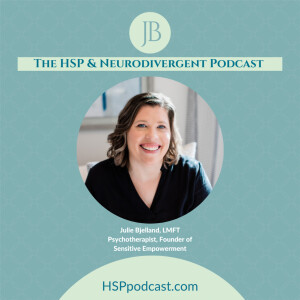
The HSP and Neurodivergent Podcast with Julie Bjelland
Education:Self-Improvement

Highly Sensitive, Autistic, or both? Understanding the Differences with Julie Bjelland, LMFT
 2024-05-06
2024-05-06
In this episode, I discuss the differences that set autism apart from high sensitivity, particularly in women. I highlight the outdated diagnostic criteria for autism and the misdiagnosis or lack of diagnosis in many women. We'll explore the unique characteristics of autistic women, such as the challenges of masking, the need for solitude, and the intense sensitivity across multiple senses. I also emphasize the importance of self-compassion and acceptance for autistic individuals and the need for a neurodiverse society.
Resources Mentioned
- Assessments and Consultations with me: https://www.juliebjelland.com/consultations-with-julie
- Stay updated! Join my free newsletter https://www.juliebjelland.com/newsletter
- Product Recommendations: https://www.juliebjelland.com/sensory-friendly
- Sensitive Empowerment Community SensitiveCommunity.com (Join my Autistic Women's Group within the community too!)
- Autism Resources (including free Autism Quiz, Assessment and Consultation Info, Research, Surveys, and Education) AutisticHSP.com
Recommended Resources: HSPcourses.com
- Brain Training Course to reduce anxiety, overwhelming emotions, and the fight/flight/freeze over-activation
- HSP & Neurodiverse Toolbox Course, I share how I balance my nervous system.
- Blooming Brilliantly Course: Learn self-love and self-compassion.
- Your Self-Discovery Journey: Spend time with me and others learning who we are and what we need at this stage of life
- Grow a Heart-Centered Business as an HSP or Autistic Individual. We do things differently!
Key Points:
- Many individuals who identify as highly sensitive may actually be autistic, prompting updates to sensitivity quizzes.
- Autistic women face hidden challenges.
- Many of us have feelings of being different and flawed.
- Autistic women require solitude to reduce overstimulation and restore energy.
- We tend to experience heightened sensitivity across multiple senses, which can be intense.
- We prefer communicating honestly and directly, valuing clarity.
- Accepting an autism diagnosis can lead to reframing experiences and self-compassion.
- Social gatherings, sudden changes, and small talk can be challenging.
- Repetitive movements serve as a way to soothe and focus, with fidget tools aiding in this.
- Written communication may be preferred and eye contact can feel intense and overwhelming.
- Managing emotions, especially when fatigued, is challenging.
- We experience high empathy.
- Building a neurodiverse society that celebrates differences is vital for our well-being.
Themes:
- Unveiling the Hidden Challenges Faced by Autistic Women
- Navigating Intense Sensory Sensitivity in Autism
- Understanding Autism in Highly Sensitive Women
- Unique Special Interests Among Autistic Individuals
- Overcoming Challenges Stemming From a World Not Setup for Us.
Sound Bites
Chapters 00:00 Introduction and Change in Podcast Title
01:21 Understanding Autism in Highly Sensitive Women
08:06 The Importance of Solitude and Alone Time
15:00 Navigating the Intense Sensory Sensitivity of Autism
25:27 Reframing Experiences and Finding Self-Compassion
28:23 Challenges in Social Gatherings and Small Talk
33:22 Creating a Neurodiverse Society that Celebrates Differences
More Episodes
Create your
podcast in
minutes
- Full-featured podcast site
- Unlimited storage and bandwidth
- Comprehensive podcast stats
- Distribute to Apple Podcasts, Spotify, and more
- Make money with your podcast
It is Free
- Privacy Policy
- Cookie Policy
- Terms of Use
- Consent Preferences
- Copyright © 2015-2024 Podbean.com





